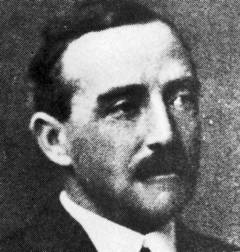Brevet Major John Edmond ‘Johnnie’ Gough - The Victoria Cross, RUSI and the First World War Part III
As part of our series looking into the lives of the RUSI members who fell during the Great War, we profile Brevet Major John Edmond ‘Johnnie’ Gough, who at the time of his death in 1915 was due to be promoted to Major-General.

‘Johnnie’ Gough was born on 25 October 1871 at Murree, India, now Pakistan. The Gough family had a long tradition of distinguished military service. Gough went to Eton before attending Sandhurst in 1891. In 1904, he attended the Staff College, Camberley. In 1907, he married Dorothea Keyes, and they had a daughter. Gough returned to the Staff College in 1909, where his lectures were highly regarded. His book, Fredericksburg and Chancellorsville (1913), was announced with high praise in the RUSI Journal in 1914 and it was required reading for military promotion examinations into the 1930s.
Gough’s Victoria Cross (VC) was awarded during the Third Somaliland Expedition, 1903–04, for his actions on 22 April 1903, at Daratoleh, British Somaliland, now Somalia. Two other VCs were awarded that day, to Captain George Murray Rolland and Captain William George Walker. The men were up at 0300 hours for biscuits and cocoa, and left camp at 0450 hours. That day’s action, in which the 200 British men were outnumbered by a sizeable hostile force of 400–1,000 spearmen and 300–600 riflemen, saw over 17,000 rounds fired. Dwindling ammunition and mounting casualties meant that Gough ordered a retreat towards Danop, and a fighting withdrawal began at 1430 hours. As the afternoon progressed, with the enemy closing to within fifteen to thirty yards of them, the rearguard became separated from the group.
One of the group, Captain Bruce, was mortally wounded, and Rolland shot the likely attacker before hauling Bruce into makeshift cover. The other men held the enemy off, but Rolland could not move Bruce alone. Rolland shouted after the rest of the rearguard, but they disappeared around the corner, causing him a ‘moment of great despair’. The enemy began shouting excitedly, believing that ‘they had got us all, and to come on and spear us’. Fortunately, Walker had heard Rolland’s desperate yell, returning to help; but, still, the men could not lift Bruce. Rolland then ran at least 400 yards under fire to retrieve a Bikanir camel from the rearguard.
On discovering the situation, Gough dashed to help. It took Rolland a full fifteen minutes to convince the terrified camel to retrace the same route. Rolland, Walker and Gough managed to get Bruce onto the camel, but he died. The enemy remained in close pursuit until 1730 hours, when they finally fell back. The men had been in combat for seven hours. The day’s ride had been 50 miles. They had eaten nothing since the biscuits and cocoa, and were not to eat dinner until 25 hours later. Rolland noted: ‘It was the hardest day of my life … I fired and fired in that fight till my rifle was boiling hot; even the wood-work felt on fire’.
Gough reported Rolland and Walker’s heroic actions, humbly leaving out his own involvement, which delayed his VC. The full story came to light eventually and Gough was gazetted accordingly. Momentously, Gough’s father was Major C J S Gough VC, and his uncle was Lieutenant H H Gough VC. Never before, nor since, had the VC been awarded to three members of the same family.
On 20 February 1915, Gough, by now a Brigadier-General and Chief of Staff to Haig, and with a promotion to Major-General imminent, was mortally wounded by a sniper near Fauquissart, France. A single bullet, fired from 1,100 yards away, hit Gough as it ricocheted. He died in Estaires, France, two days later. Gough was posthumously awarded the KCB, a rare privilege, and also held the CB and CMG. He is buried in the Estaires Communal Cemetery, Plot II, Row A, Grave 7. His VC is held in the Royal Green Jackets Museum, Winchester.
His death was a blow to Haig, who counted him ‘my old friend’, and many of Gough's colleagues offered words of praise and respect, noting he was ‘at his very best when battle fighting’ and a man to count on in times of crisis. Their sentiments are perhaps best expressed in the words of Major-General Sir George Aston, a Staff College instructor, who said that Gough was killed ‘too early in the war to reach the high position in which his sterling character and transcendent qualities would undoubtedly have placed him’.
Ashley Ryan, RLMH volunteer, Trench Gascoigne essay prize winner (2016)
This article is the third in a nine-part series to be published in the RUSI Library News.
Past stories
Part II Charles ‘Fitz’ FitzClarence
Part III For Valour: The Victoria Cross, RUSI and the First World War
If you would like to learn more, go to https://RUSI.org/GreatWar
Bibliography
Max Arthur, Symbol of Courage: A History of the Victoria Cross (London: Sidgwick & Jackson, 2004).
Ian F W Beckett, Johnnie Gough, V.C.: A Biography of Brigadier-General Sir John Edmond Gough, V.C., K.C.B. (London: Tom Donovan, 1989).
Ian Beckett, Timothy Bowman and Mark Connelly, The British Army and the First World War (Cambridge: Cambridge University Press, 2017).
Kevin Brazier, The Complete Victoria Cross: A Full Chronological Record of All Holders of Britain's Highest Award for Gallantry (Barnsley, South Yorkshire: Pen & Sword Military, 2010).
Arthur Lincoln Haydon, The Book of the V.C. (London: Andrew Melrose, 1906).
George Rolland to unknown recipient. n.d. Quoted in Michael Ashcroft, Victoria Cross Heroes (London: Headline Review, 2007).
Rolland to unknown relative. The Times (10 August 1903). Quoted in Ian F W Beckett, Johnnie Gough, V.C.:
A Biography of Brigadier-General Sir John Edmond Gough, V.C., K.C.B. (London: Tom Donovan, 1989).
RUSI Journal, ‘Notices of Books’ (Vol. 58, No. 432, 1914), p. 281.
RUSI Journal, ‘Great War Stories: RUSI’s Fallen Members’ (Vol. 162, No. 3, June/July 2017), pp. 4–10.
